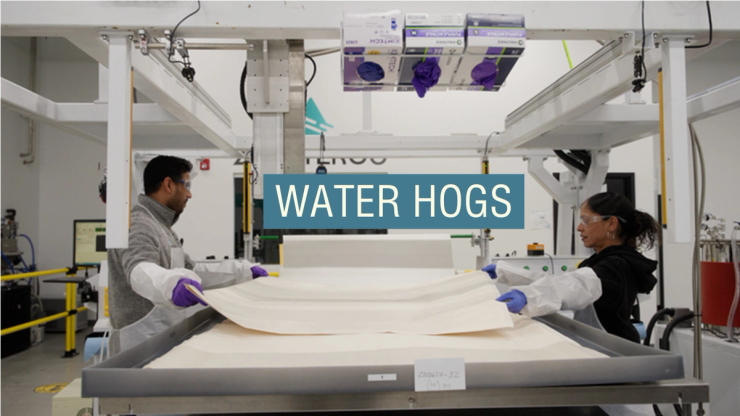The Scene
Alex Rappaport thinks he can turn a big profit expanding his business from industrial-scale hog poop ponds to hyperscale AI data centers.
As CEO of the water filtration startup ZwitterCo, Rappaport’s typical customers are ethanol refineries, mines, commercial farms and food processors, or any other industrial facility that needs to clean and recycle a lot of water. The company has raised about $100 million in the last few years to build out filters made of a proprietary material that sloughs off contaminants and waste — pig poop, for example — so that it can filter large amounts of water without needing to be replaced.
Water has always been a niche and undervalued corner of climate tech, Rappaport says — in 2023, water-related startups globally raised about $1.5 billion, compared to $43 billion for climate tech at large. But that’s beginning to change, as the increasing frequency and severity of droughts due to climate change makes it plain to commercial water users that reducing their water footprint is an operational necessity. And a new class of customers is particularly drawing Rappaport’s attention: Data centers, which last year used about as much water globally — mostly to keep AI-crunching chips cool — as the city of London uses in a typical four-month stretch.
ZwitterCo hasn’t yet locked in any data center clients, but Rappaport is keen to. With data centers on the rise, he said, “market forces might have finally reached a threshold where there is enough buying power and enough pervasiveness of this problem that [water sustainability solutions] could become a new trillion-dollar industry that venture capital can get really healthy returns from.”
In this article:
Tim’s view
Data centers are usually under scrutiny for their massive hunger for energy. But their thirst may prove to be a bigger problem — with a juicy payoff for companies able to serve up solutions.
Amazon, Microsoft, Google, and other data giants have proven inventive at finding fixes for their energy problems, including by signing deals with cutting-edge clean power providers and engaging in complex energy arbitrage schemes. But they’ve been slow to deal with the water problem. Google used 6 billion gallons of water last year, mostly to cool data centers, compared to 4 billion in 2020.
In some ways, energy solutions are making the water problem worse, said Jason Pontin, a general partner at the climate-focused venture firm DCVC, who has led the firm’s investment in water tech, including in ZwitterCo. The evaporative cooling systems that are commonly used in data centers are more energy-efficient than conventional air conditioning, but release large volumes of water as steam. And the development of data centers in places with access to abundant, low-cost clean energy, like solar-rich Arizona or Dubai, are sometimes places under extreme water stress. And as AI-crunching chips get more powerful, their cooling needs rise.
Industrial water consumers have long worked under the assumption that the resource is essentially limitless and free, undermining any rationale for investing in conservation solutions. That is no longer tenable as record-breaking temperatures and drought become routine. Industries that used to rely on fresh groundwater are under growing pressure from consumers, shareholders, and regulators to cut back and find alternative sources.
“We’ve created this entirely new, amazing technology, but to think we can just suck water out of the ground to run it is nuts,” Pontin said. “Industrial water, polluted water, brackish water, atmospheric water, desalination — these are the sources that are going to drive the next century’s economic growth, so that’s why we’re betting in this space.”
ZwitterCo’s approach is focused on recycling: High-tech filters could make it economical to repurpose waste or other low-quality water for data centers’ needs and reduce their reliance on groundwater. Ecolab, a multinational water consulting firm, is rolling out new services for data centers to monitor their real-time water use, and estimates that simply making more efficient use of water in conjunction with existing data center technology could reduce a centers’ water use by one-third. LiquidStack, an US-based firm, is pitching data centers on systems that cool chips directly by piping a mix of water and chemicals across a cooling plate on their surface. The companies’ clients used to only ask about this service as a means to improve the performance of super-powerful, super-hot chips, said Angela Taylor, the company’s global strategy director. Now, an increasing number want it as a means to cut their water footprint. She sees a future where data centers in all but the hottest places could eliminate evaporative cooling altogether.
The View From Google
Big Tech is aware that it has a water problem. Google, for one, is committed to replenish more water to aquifers than it consumes by 2030, for example by setting up systems near its data centers to recycle municipal wastewater. “We are committed to finding sustainable ways to deliver our products and services and support the growing digital economy,” Ben Townsend, the company’s head of infrastructure strategy and sustainability, told Semafor.
For Pontin, the dual imperative that tech companies face in needing to grow their digital infrastructure footprint while also meeting sustainability goals is what creates an opening for savvy startups. “Every single problem that we care about in deep tech cannot be solved, or at least is much harder to solve, without solving the water problem,” he said.
Room for Disagreement
Just because the opportunity is there doesn’t mean that every water-conservation startup will be a slam dunk for investors, said Tom Ferguson, founder and managing partner of the water-focused venture capital firm Burnt Island. The rapid pace of chip development by companies like Nvidia means water startups will always be chasing a moving target. And he’s wary that once water startups start to align their business with the red-hot AI sector, they could begin to have unrealistic expectations about their valuations, potentially a turnoff for early investors.
Still, he said, “we really just fundamentally think water is a unidirectional megatrend. It literally cannot get less important.”


